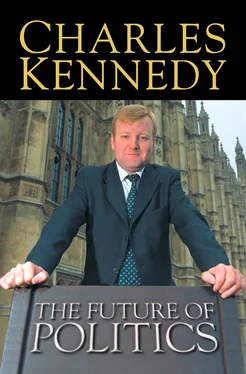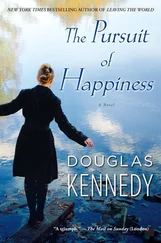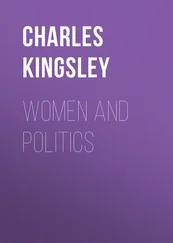Following on from the fuel crisis, came the floods – the other side of the story where climate change is concerned. During the flooding it became rapidly apparent that politicians are not talking nearly enough about the big issues, such as climate change, and that these will make a massive difference to the way that we all live our lives in the decades to come. Unless they start to do so, politics will never reconnect with the people it is losing – and politics will have no future.
This book is about the future, but it is also about me and it is about us – the British. It is one person’s reflections on the United Kingdom, and that person’s reflections upon himself. What makes this Kennedy fellow tick? What makes him angry, what makes him sad? What fires his passion? By the way, does he possess passion? Why is he a Liberal Democrat, and who are these Liberal Democrats anyway?
The story begins in the West Highlands of Scotland in November 1959 and I cannot tell you where it might yet end. My first visit to London was not until the age of seventeen; my third visit was as a newly elected Member of Parliament in 1983. A friend put me up, in those first few crazy weeks, in his spare bedroom in Hammersmith. I didn’t know how you got to Hammersmith from Heathrow airport. I had no idea where Hammersmith stood geographically in relation to Westminster. It was a fast learning curve.
It was not until August 1999, when I was elected as Liberal Democrat leader by the party’s members, that I experieced again anything remotely comparable. The party leadership transforms your life almost out of all recognition, but for the better. You learn every day of the week, and you are never really off duty, but you experience a profound sense of duty in the process.
This book is part of that process. It is about attitudes and aspirations, hopes and fears. It is also about ambition. I am extremely ambitious for the Liberal Democrats, for two solid reasons. First, I believe that we are more correct in our diagnosis as to the nature of the problems of the body politic – and how they can be cured – than are the other parties; second, I am convinced that we will secure the opportunity to put these beliefs into governmental action.
Back to the West Highlands. If you had told me, when I was growing up, that one day not only would there be a Scottish parliament, but that it would involve the Liberal tradition at ministerial level, then I think I would have been ever so slightly sceptical. It has happened. My friend, Jim Wallace, now presides over the system of justice in Scotland.
Due to the initial illness and then tragic, premature demise of Donald Dewar, Jim has also exercised full First Ministerial authority on two separate occasions. 3 Конец ознакомительного фрагмента. Текст предоставлен ООО «ЛитРес». Прочитайте эту книгу целиком, купив полную легальную версию на ЛитРес. Безопасно оплатить книгу можно банковской картой Visa, MasterCard, Maestro, со счета мобильного телефона, с платежного терминала, в салоне МТС или Связной, через PayPal, WebMoney, Яндекс.Деньги, QIWI Кошелек, бонусными картами или другим удобным Вам способом.
Jim’s staple diet these days is red boxes, decision making, trying to get public policy more right than wrong. He is a Liberal Democrat making a serious difference to people’s lives; in December 2000 he became a Privy Councillor and was named ‘Scottish Politician of the Year’ by the Herald. In Opposition at Westminster you make sounds and faces; in the Scottish coalition, Liberal Democrats are taking decisions.
Leadership in contemporary politics has become too much about lecturing and not nearly enough about listening. Some politicians are prone to rant and rave, but Jim and myself have never been from that stable. We need more people of Jim’s sort in public positions. And we need much more liberal democracy in public life. I am determined to help secure such an outcome.
Mine has been a distinctly curious political lineage, all things considered. I joined the Labour Party, at home in Fort William, aged fifteen. As I describe later, that entanglement didn’t last very long. I soon found the dogmatic class war that many Labour activists were fighting thoroughly unpalatable. At the University of Glasgow I was sympathetic to the Liberals but joined the SDP, for which Roy Jenkins can be fairly and squarely blamed.
Out of the unhappy state of British politics in the late seventies, came Roy Jenkins’ famous 1979 Dimbleby Lecture, ‘Home Thoughts from Abroad’. Every so often in life, you hear someone articulate your own thoughts – and they do so with an elegance and eloquence which make you wish you had been able to say it yourself. Roy Jenkins’ Dimbleby lecture had that effect on me. He brought sharply into focus the unease that I, as an open-minded, pro-European, moderate-thinking Scot, felt about the choices that Labour and the Conservatives were offering the British people.
Roy offered a vision of the type of political party I wanted to join. He spoke of the need for a party of the radical centre to bring about constitutional and electoral reform at the heart of our political life, to end the failures of the two-party system. The new political system that resulted would allow parties to co-operate where they shared ideas. The new party that Jenkins saw leading these changes would also devolve power, while advancing new policy agendas for women, the third world and the environment. He spoke too of the need to establish ‘the innovating stimulus of the free market economy’ without the ‘brutality of its untrammelled distribution of rewards or its indifference to unemployment’.
The Dimbleby Lecture was a rallying cry for those who wished politics to move beyond the class war that it had become, and it struck many chords. It was a vision of a radical, decentralist and internationalist party, combining the best of the progressive Liberal and social democratic traditions. It was a vision of the party that the Liberal Democrats have become. From the first, I was clear that I wanted to be part of this new force in British politics. So when the SDP was launched in 1981, I was an early member. A blink or two later and I landed up as the youngest MP in the country, having defeated a Conservative minister in the process in Ross, Cromarty and Skye. There followed a lot of listening and, I hope, learning.
There is a popular, recurrent misunderstanding about the Liberal Democrat neck of the woods in politics. Many people – journalists and the wider public alike – seem to think that operating within the confines of the SDP, an SDP-Liberal Alliance, and the Liberal Democrats today, is somehow less demanding than being Labour or Conservative. Believe you me, it’s not. It is every bit as demanding and, to a certain extent, even more so.
You have to fight for every column inch. You get two questions on a Wednesday afternoon at Prime Minister’s Question Time – when the leader of the Opposition can rely on six. Contrary to popular opinion, the job of leader does not carry a salary. No complaint there. You occupy a certain space in the unwritten constitution of the land – from State occasions to the Privy Council – but somehow you are not quite part of the in-crowd. It is all very curious.
Since 1983 my world of politics has changed out of all recognition, and not just due to the party’s achievement and progress over nearly two decades – the landscape of politics itself has altered. The key issues that set the tone for much of the twentieth century – socialism v. capitalism, public v. private ownership – are now no longer debated. Today the issues are quite different – professionalism v. the market, interdependence v. nationalism, community responsibility v. self-interest.
Читать дальше












